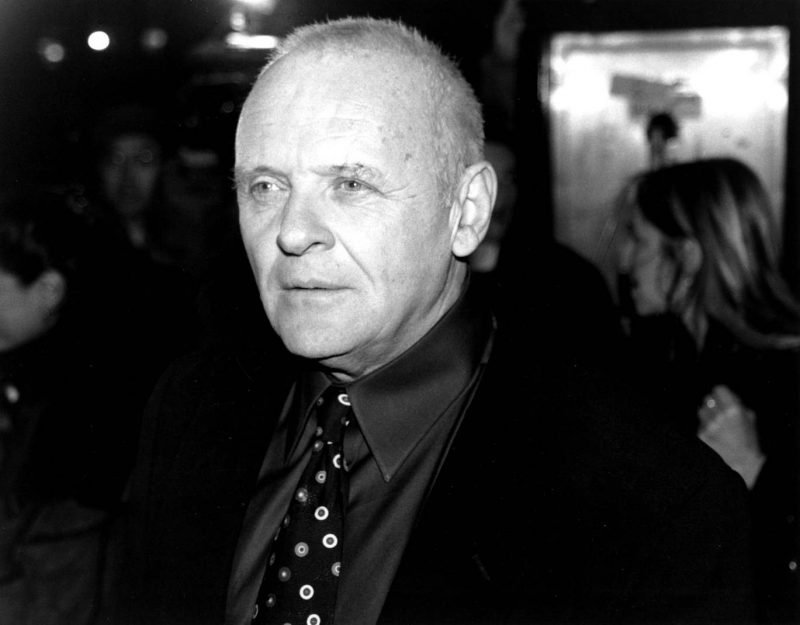 Photo Credit: Everett Collection/Shutterstock.com
Photo Credit: Everett Collection/Shutterstock.com
It was 1973—20 years before he was knighted by Queen Elizabeth II—and Anthony Hopkins was having a grand old time, living it up at the Sunset Marquis with a bottle of tequila. His perception was heightened: he could see colors and shapes along with the stars that lit up the sultry L.A. skyline.
Although his poison of choice now is English Breakfast tea, since he went sober in 1975 (after an epiphany that alcohol could cost him his health, career and relationships), Hopkins believes that a lingering hangover from his drinking days continues to inspire his art. “I use a lot of colors—very bright, psychedelic colors,” he says of his signature acrylic abstracts, surrealist portraits and dreamy, lush landscapes inspired by his 2001 celebratory road trip across the American Midwest after becoming a U.S. citizen.
“When I came out to California 40 years ago [to expand his predominant stage career into film], I was drinking tequila. I was tripping out: I’d see everything in color. I was taken in by all the colors, all the vibrations. I don’t see them anymore because I don’t drink anymore but, back then, I had heightened perception—like LSD or hallucinogenic drugs. I didn’t do those, but I think [my artistic style] is a hangover from that. I love pouring all kinds of incandescent colors into paint.”
Admit it: you’re surprised. This is an unfamiliar Sir Anthony Hopkins, not the knighted Welsh stage and screen thespian who has won an Academy Award, the iconic Cecil B. DeMille Award, three BAFTAs and two Emmys. This is Tony, as he refers to himself, and the man isn’t just an award-winning actor; he’s a true artist in every sense of the word.
“I go in the studio, thinking, ‘Oh, there’s a blank canvas,’ and I’ll start putting paint on it. Out of the mixtures of colors, I can carve the face [of a portrait] and it just emerges on its own,” he says.
Painting, like preparing for an acting role, is really as easy for him as it sounds. In fact, don’t even get him started on his so-called method. “‘Process,’ ‘reaching out,’ ‘talk us through that,’ ‘walk us through that.’ What the hell are they talking about? It’s gobbledygook. ‘What’s your process?’ I guess I’m Zen! That’s just life. When people say, ‘What is your process of living?’ I think, ‘I hope my heart keeps ticking through the day, I hope my blood flows through my body, and I hope I go to sleep at night.”
You also won’t find Tony pontificating for hours about the meaning behind his art. “They’re symbolically meaningless,” he says of the intense, splashy dreamscapes. “I just like to paint.”
He didn’t always; although he has been drawing since his boyhood, his interest in painting flourished later in life at the encouragement of his late friend Stan Winston, the Oscar-winning visual effects artist behind the Jurassic Park and Terminator series. During a barbeque at Casa de Hopkins, Winston spotted one of Hopkins’ pieces and expressed interest in learning about the artist. “He said, ‘Who did these?’ I said, ‘I did’ and pulled a face. He said, ‘They’re wonderful!’
I said, ‘I have no training.’ He said, ‘Well, don’t train because, once you do, you spoil it. I think you have an instinct for it.’”
Though Winston got the ball rolling, it was Hopkins’ then-fiancée Stella Arroyave, an art and antiques dealer, who truly pushed him to indulge his passion without fear, urging him to create 75 pieces for their 2003 nuptials. He had expressed his uncertainty about tackling such a big venture, but she simply told him, “They’re not going to put you in jail if it doesn’t work.”
Hopkins is a rational man. He saw the wisdom in his now-wife’s words and has been creating ever since, selling more than 100 works at his very first exhibition back in 2005 in San Antonio, Texas, which benefited the Born to Read Literacy Foundation. In 2009, his paintings made their way around Europe and North America through a formal tour and, in December 2015, he opened a permanent exhibition of limited edition serigraphs and original acrylics at the Jeff Mitchum Galleries at the Bellagio and MGM Grand in Las Vegas.
By and large, his paintings have received a plethora of praise; statements like “creative genius” and “a prolific contemporary artist” trail in his wake. All of his works share a certain commonality: they are lively, vivid and vibrant. “I love bright, bright colors,” he says. “That’s Stella’s influence.”
His wife has not only inspired his art, but his attitude about it. She gave him the freedom to fail—allowing him to create for himself. “When I paint, I’m carefree about it. I don’t overanalyze it, I don’t worry. I paint, I go in the room the next day and I look at [what I’ve done]. I’ll paint again or I’ll think, ‘That’s it, don’t mess with it.’” He adds, “Once you’re free of caring what the results are, you are really free in your life. I don’t worry about failure, and I don’t worry about the results.”
According to Hopkins, he creates when the mood strikes him, but puts little thought into his work after it leaves his studio. “I don’t have expectations. I don’t know what happens to any of my paintings. I don’t know where they go; I just know that I sell them. It’s a freedom I have and it applies to everything. I make a movie and, once it’s done, I think, ‘It’s done, it’s over, and there’s nothing I can do about it.’”
THE TRANSFORMATION
On a Monday afternoon in June, Hopkins sits serenely in an outdoor garden suite at the Hotel Bel-Air sipping tea with honey. He is peaceful; miles away from the image he describes of himself as a hyperactive child.
“When I was a little boy, I could never sit still long enough to concentrate. I suppose they call it ADD now. I was just restless, I never finished anything,” he says. “It’s still in my nature to move quickly and not overdo things. It’s the same with everything in my life [except] acting and music. When I was younger, I used to worry about the results but, now, I don’t care. One finds a whole new sort of creative life in just slowing down.”
At 78, Sir Anthony Hopkins has earned the right to sit back, relax and smell the magnolias
blooming behind him. He’s a man who has done it all. He was discovered by the great Sir Laurence Olivier while attending London’s Royal Academy of Dramatic Art; Olivier not only became his mentor, but invited him to join the world-renowned Royal National Theatre.
Hopkins has now starred in hundreds of films, plays and television shows, won an Oscar playing Hannibal ‘The Cannibal’ Lecter in Jonathan Demme’s Silence of the Lambs, composed six symphonies and penned the entire score for his 2007 film, Slipstream. He also released a classical album and had one of his pieces performed by the great André Rieu, backed by the Johann Strauss Orchestra.
Most recently, he starred in The Dresser, a film set during World War II that revolves around the relationship between a Shakespearean star (Hopkins) and his dresser, played by fellow legend Ian McKellen. He refers to this experience as “the high point of my life.” Next up: he’ll reprise his role as Odin in Thor: Ragnarok and has, with much fanfare, accepted a still-undisclosed role in Michael Bay’s upcoming Transformers: The Last Knight.
A Transformers film seemed like an unlikely choice for the stalwart thespian but, he laughs, “I’m a gypsy! [And it] will be another great adventure.” He adds that the opportunity came up pretty organically, via his agent: “I said, ‘Yeah! I like that sort of stuff. Michael Bay? Yeah, yeah, sure, I’d love to do that.’ I agreed before I’d even seen the script. I actually met Michael here at the Hotel Bel-Air a few weeks ago [to discuss the film].”
There is no imminent danger of retirement, clearly, and there never really was. “It was only a brief period [where I considered it],” he maintains. “I was very tired; I had gone through a divorce and I unwittingly said so. This was almost 20 years ago. Somebody said, ‘What do you mean you’re tired?’ I was doing the same old thing, I was in a bad movie and I thought, ‘Oh God, why do I bother?’ and they put it in the paper.”
Hopkins has a great reason for continuing to work so often: “I’m going to be 79 next year— I’ll be coming up on my 80s. I think, if you keep your memory, if you work and work and work hard, it will keep your brain active. When men retire too young, they tend to die. I knew a guy who couldn’t wait to retire—he couldn’t wait to play golf—and he was dead within a year. I think to myself, ‘I don’t want to golf; it’s chasing a ball. I just want to keep working and working and working.”
Painting, composing, acting and spending time with his wife—these are things that Sir Anthony Hopkins values. “In our society today, we live so fast and we all want to accomplish so much all the time, especially in America. If you sit back and you don’t do much, people say you’re boring. Fine! I don’t care!” he insists.
“I don’t—and this is a flaw of mine—have any friends, really. I have a couple of acquaintances. All of my wife’s girlfriends are my friends, but I don’t seek out other people, actors. I go and do my job in films and they say, ‘Let’s all get together and have dinner tonight!’ I’ll say, ‘No thanks, not for me.’ I’m not interested in the society of being an actor, going to parties and such. I did all that.”
“I’m not lonely, but I love solitude,” he continues. “I love to be on my own. I like to live a quiet life, live slowly. Therefore, when I play the piano, I practice slowly. It’s pointless rushing anything because the reason we rush about is to get the results. Our whole society’s been like that. [It’s the same] in film, too: ‘Get an Oscar!’ It’s totally meaningless.”
He refers to a particular student he had while teaching an acting class at UCLA. “This guy was so worried that I sensed he was using some kind of drug; he was so intense about the scene. I didn’t want to humiliate him, so I said, ‘Hold on a minute. Can I ask you a question?’” It was not, we predict, what said gent was anticipating. “I said, ‘You know you’re going to die one day? So why are you getting into this state? It’s only acting; it’s not important. Have some fun with it.’ People think that’s a weird way of looking at life, but attitude is everything. If you worry about it all and you have a bad attitude, then life is just a waste of time. Because, one day, it’s going to be over.”
Sir Anthony Hopkins’ advice? “Ask nothing, expect nothing and accept everything. And then, life’s pretty cool.”




















